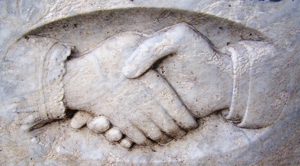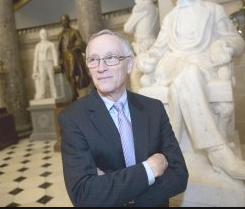Bulletin News

09/16/2013
The 2013-14 Rozanne M. Brooks Lecture Series at SUNY Cortland this year takes on the theme of “Cultures in Conflict, Pathways to Resolution.”
“The presentations range from how elected U.S. officials work out — or sometimes don’t work out — to disagreements, to women’s contributions to — and experiences in — the Arab Spring,” said Sharon R. Steadman, a SUNY Cortland professor of sociology/anthropology who is the lecture series organizer and Brooks Museum director.
“Speakers also will address the ongoing conflicts between Turkey and Europe, how domestic policy on crime sometimes creates even more conflicts, and how migrants and asylum-seekers are kept, literally, at the margins of the countries in which they seek refuge.”
The series, which is free and open to the public, features a reception before each presentation. Three guest speakers will present during the fall semester, and the series will feature a poster session and two guest-speaker lectures during the spring semester.
The talks take place on Wednesdays and begin at 4:30 p.m. in Moffett Center, Room 2125. Before each lecture, a reception to welcome the speaker starts at 4 p.m. in the Rozanne M. Brooks Museum, Moffett Center, Room 2126.
The series opens on Sept. 18 with a presentation by Jay Pierson, the former floor assistant to the Speaker of the U.S. House of Representatives.
 |
| Jay Pierson |
Pierson served as floor assistant to various leaders and speakers of the U.S. House of Representatives from 1978 until 2012. His talk, “Conflict Resolution in the Congress: an Oxymoron?,” will include personal ideas about ways to deal with or avoid conflicts in the House and among the House and Senate and President.
He also will describe his role in the House and how Congress is supposed to work.
Born in Santa Barbara, Calif., he graduated from Westmont College with a degree in English literature. Pierson obtained his master’s and doctoral degrees in the same field from Long Beach State University and University of Maryland, respectively.
The remaining fall semester speakers include:
• On Oct. 23, Alison Mountz, an associate professor of geography with the Balsillie School of International Affairs at Wilfrid Laurier University, will explore the processing and detention of migrants and asylum-seekers on islands. Her talk, “Island Detentions: Migration, Enforcement and Struggles Over Asylum,” focuses on the peripheral edges of sovereign territory where migrants try to land, work and seek asylum. These islands also are significant for border authorities, raising complex issues surrounding legality, sovereignty, governance and exclusion.
• Larbi Touaf, currently serving on the SUNY Cortland faculty as a Visiting Fulbright Scholar from Morocco, will address the topic of “Democracy and Women’s Rights after the Arab Spring.” Touaf’s Nov. 13 talk focuses on how the widespread protests that went through North Africa and the Middle East were driven by a young generation that aspired mainly to political change. After decades of authoritarian rule, most political parties, including the opposition, were seen as opportunistic and not wholly concerned with the welfare of the people. Therefore only “Islamist” parties, who never have been involved in power, seemed uncorrupted. The situation has allowed them to win elections almost everywhere. However, there are two problems with these parties. They are not really favorable to women’s rights, and they consider democracy as a western shibboleth. Touaf is an associate professor of English at Université Mohammed I Oujda.
The spring semester will feature the following events:
• Alexander Balas, who recently joined SUNY Cortland as an assistant professor of international studies and is the new director of the College’s James M. Clark Center for International Education, will discuss the things that divide and unite Turkish and European cultures. His Feb. 26 talk on “Turkey and Europe: Cultures in Conflict?,” will explore the current conflict between Turkey’s European and Middle Eastern cultures and its impact on European Union-Turkey relations. Religion and secularism in Turkish society, women’s rights and the freedom of mass-media are just a few of the fault lines tackled during this lecture.
• SUNY Cortland students will conduct a poster session titled “Global Conflicts, Roads to Peace?” from 3:30 to 4:30 p.m. on March 19 in the Moffett Center Sociology/Anthropology Lobby. Then a series of student presentations will take place from 4:30 to 5:30 p.m. in Moffett Center, Room 2125.
• On April 2, Herbert Haines, SUNY Cortland professor of sociology, will review an American “disorder” in which U.S. lawmakers tend to react to crime panics by enacting legislation from the “gut” rather than the head. His talk, titled “Post-Traumatic Crime Policy Disorder,” will touch on several case studies that exemplify the tendency: Rockefeller Drug Laws, 1980s federal drug policy, California’s Three- Strikes Law, and Sex Offender Registry laws. Haines asserts that, relatively soon after its passage, such post-traumatic legislation is recognized as counterproductive, but perverse political dynamics delay its being reversed — often for decades. By the time corrective measures do get taken, significant human and fiscal damage have been done.
The 2013-14 Brooks Lecture Series is sponsored by a grant from Auxiliary Services Corporation (ASC) and the Cortland College Foundation. For more information, contact Steadman at 607-753-2308.

